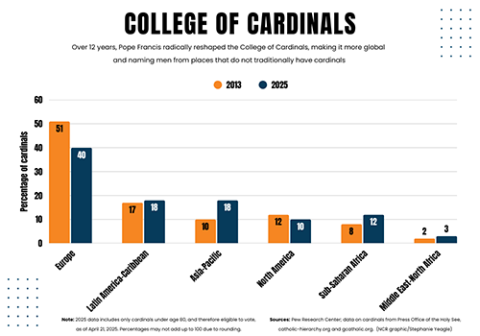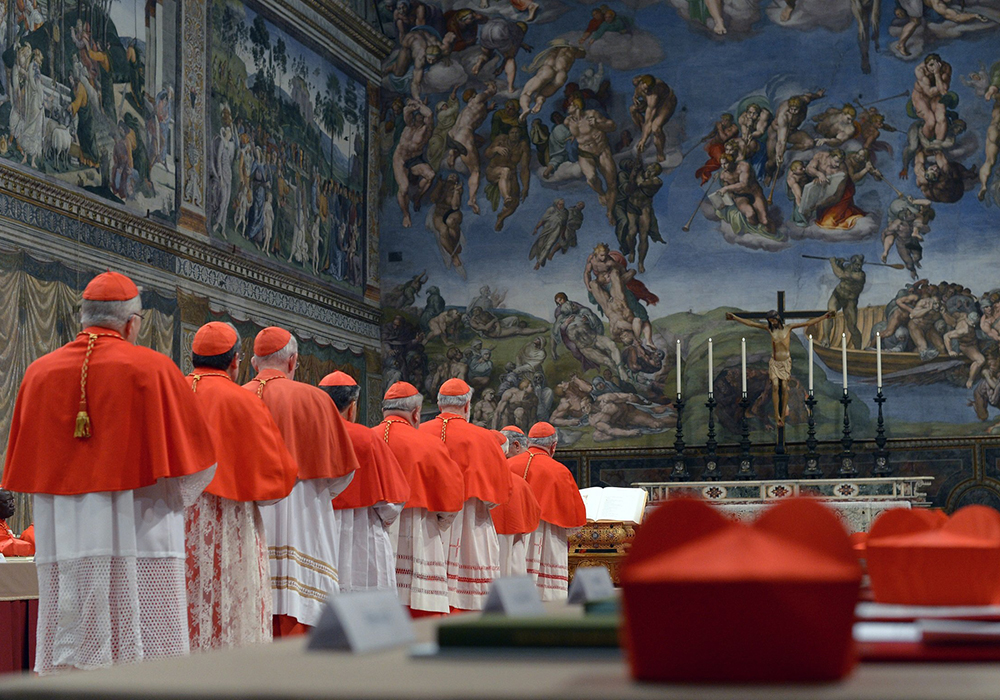
Cardinals from around the world line up in the Vatican's Sistine Chapel March 12, 2013, to take their oaths at the beginning of the conclave to elect a successor to Pope Benedict XVI. The following day, on the fifth ballot, they elected Cardinal Jorge Mario Bergoglio of Buenos Aires, Argentina, who chose the name Francis. (CNS/Vatican Media)
When the world's Catholic cardinals enter the Sistine Chapel to elect the next pontiff, eight out of ten will share one primary thing in common: They were all elevated to their rank by Pope Francis.
As they gather for what is expected to be the largest conclave in history, the cardinals now face a stark choice: to continue along the path of reform as the trailblazing Francis — of opening the church up to the modern world and making its structures more inclusive — or to initiate a course correction.
Three critical factors will weigh heavily on the men in red hats as they gather to decide who will emerge wearing a white one: theology, geography and personality.
Pastoral theology
History's first pope from the Global South and the first Jesuit to ever be elected pope meant he had different priorities and approaches than his two most recent predecessors, known more for their emphasis on doctrine and discipline, rather than Francis' preference for personal accompaniment.
In a 2023 interview with the National Catholic Reporter, U.S. Cardinal Robert McElroy said Francis' emphasis on pastoral theology would be his most important contribution to the church.
Francis' approach to theology, said the cardinal, offers the ability "to respect the questions of doctrine and dogma, and, of course, Scripture, and yet to see that the key element of that is the application of the Gospel to people's real lives and that that is as important an endeavor as coming to the truth in and of itself in an abstract way."
Francis' pastoral theology was a trademark of his papal leadership and now the cardinals must decide if they want to elect a successor to continue it forward.
Advertisement
Geography
Of the 135 cardinals eligible to participate in this papal conclave, a staggering 108 were appointed by Francis. In order for a pope to be elected, a candidate must receive two-thirds of the votes; in this case, 90 votes if all 135 cardinal electors participate in the conclave.
Over 12 years, he radically reshaped the College of Cardinals, making it more global and naming men from places that do not traditionally have cardinals. There is no cardinal in Paris or Milan today, but churchmen in Juba, South Sudan and Port Moresby, Papua New Guinea, are now represented in the elite body tasked with electing the next pope. [Click the infographic at right for more.]
According to the most recent analysis from the Pew Research Center:
- Asia-Pacific accounts for 18% of voting-age cardinals, up from 10% in 2013.
- Sub-Saharan Africa accounts for 12% of cardinals, up from 8%.
- The Latin America-Caribbean region has 18%, up from 17%.
- The Middle East-North Africa region has 3%, up from 2%.
- Europe has 40%, down from 51%.
- North America accounts for 10%, down from 12%.
This geographic diversity will mean that the 135 men will have a vast range of priorities. Among them are sharply differing opinions on geopolitical concerns, including the Vatican's controversial agreement with the Chinese government on the selection of bishops; the ongoing wars in Ukraine and Gaza; the global demise of multilateralism; the church's response to climate change, migration and much more.
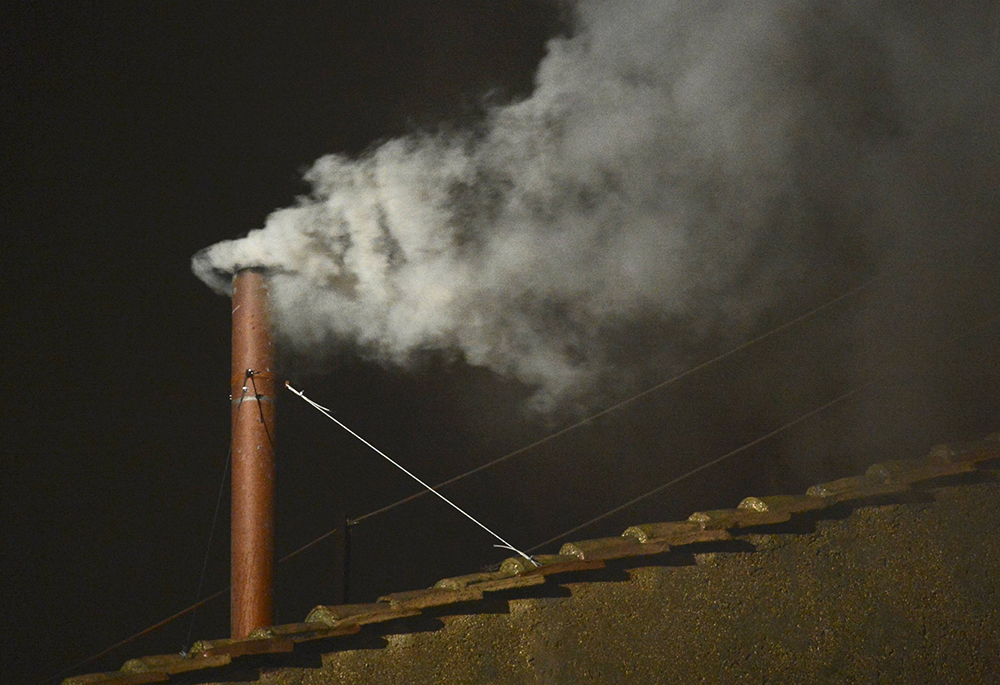
White smoke rises from the chimney above the Sistine Chapel in the Vatican, indicating a new pope has been elected, March 13, 2013. When The world's Catholic cardinals enter the Sistine Chapel to elect the next pontiff, eight out of ten share the distinction that they were elevated to their rank by Pope Francis. (CNS/Reuters/Dylan Martinez)
The different backgrounds of the cardinal electors will mean there will be varying levels of experience on the church's ongoing efforts to combat the scourge of clergy sex abuse. Cardinals coming from countries that have already had a national reckoning on the issue — typically in the West — will likely be preferred over candidates that have yet to be vetted or tested on the issue.
One final major challenge: by radically diversifying the College of Cardinals, many of the men gathering in conclave are unlikely to know many of their fellow cardinal electors. The general congregations — private meetings in the lead-up to the election of the next pope — will be critical in providing an occasion for them to get to know one another and audition possible candidates. Cardinals are invited to give what are called interventions, short speeches on topics of their choice. This process gives a strong advantage to those with greater name recognition and especially Roman curial cardinals that lead Vatican offices.
But in the words of the Argentine-born Francis upon his election in 2013, the cardinals went to "the ends of the earth" to find him. Geography isn't destiny and there will be other considerations at play.
Personality
During his 12-year papacy, Francis communicated as much through gestures as he did words.
His magnetism and desire to be the "people's pope" landed him as Time magazine's person of the year in 2013 and provided the Catholic Church with a major PR boost after years of bad headlines.
His personal witness gave credibility to the message he preached and now the cardinals must decide what sort of personality they want to govern the church. Will the next pope be a man of governance, more interested in internal affairs and management concerns? Or will he be motivated by a missionary drive to preach the Gospel?
In the general congregations and backroom conversations in the days ahead, cardinals must decide their priorities.
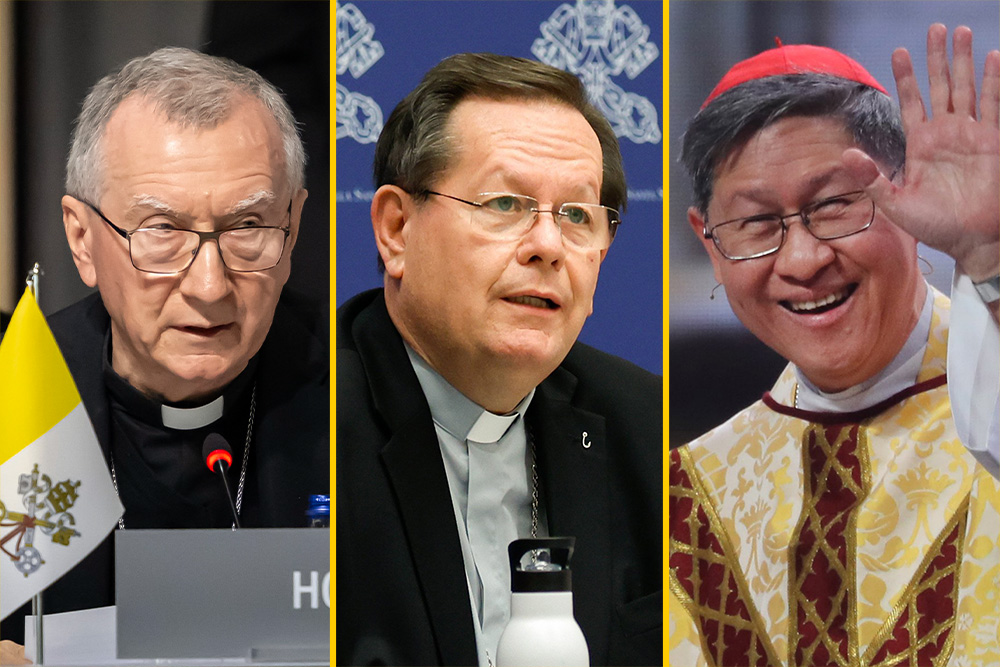
From left: Cardinal Pietro Parolin (CNS/KEYSTONE/EDA/POOL/Alessandro della Valle); Canadian Cardinal Gérald Lacroix (CNS/Lola Gomez); Cardinal Luis Antonio Tagle (OSV News/Bob Roller)
The leading contenders
There is no clear favorite heading into the conclave. And because there are no political parties in the Catholic Church and no public nominating process, list of so-called papabile (an Italian term for "pope-able," or possible popes) emerge when certain potential candidates meet certain qualifications: leadership experience, prominent writings and whispers among the cardinals themselves as to who they are looking at as possible contenders.
Add to the equation: an aggressive and influential Italian press, the increase of social media pressure and efforts by conservative groups seeking to sway the outcome in the election. Efforts to predict who comes out with the church's top job can sometimes seem like a fool's errand.
But among the frontrunners who are certain to be discussed are:
- Italian Cardinal Pietro Parolin, 70 served as Francis' longtime secretary of state and has served his entire career in the Vatican's diplomatic service. Parolin brings to the table serious name recognition — and in a conclave where the cardinals will not know each other as well, the importance of this cannot be understated. At the same time, he lacks any sort of pastoral experience, a fact that many cardinals find hard to square with Francis' emphasis on the need to have the "smell of the sheep."
- Italian Cardinal Pierbattista Pizzaballa, 59, is a Fransican friar, who is the Latin patriarch of Jerusalem. For three decades he has served outside of his native homeland and his intricate knowledge of the Middle East at this delicate time could be seen as a real asset. But his age could work against him. The nearly three-decade pontificate of Pope John Paul II still troubles many cardinals who will be reluctant to give a lifetime appointment to someone that could foreseeably serve for 30 years.
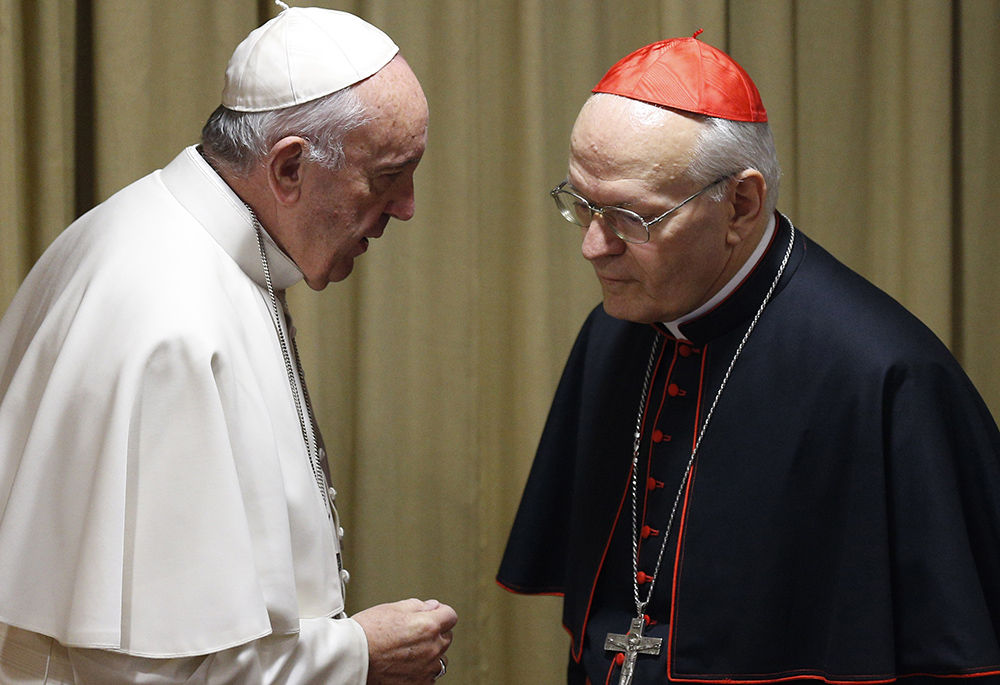
Pope Francis talks with Cardinal Péter Erdő of Esztergom-Budapest, Hungary, relator for the extraordinary Synod of Bishops, before a synod session at the Vatican Oct. 24, 2015. (CNS/Paul Haring)
- Hungarian Cardinal Péter Erdő, 72, the archbishop of Esztergom-Budapest is a leading favorite among conservatives. Erdő is a theological conservative and was the candidate for the late Australian Cardinal George Pell who, until his death in 2023, was leading the charge for a next pope that is very different from Francis. But Erdő's proximity to Hungary's nationalist Prime Minister Viktor Orban will raise eyebrows among cardinals wary of the rising authoritarian tides around the world.
- Filipino Cardinal Luis Tagle, 67, head of the Vatican's evangelization office, was considered papabile in 2013. Often referred to as an "Asian Francis" for his love of the poor and his humility, he has serious star power that will make him a winning candidate for those keen to make sure the church's profile in the public square remains attractive. Although there is an appetite in some quarters for another pope from the developing world, questions remain about Tagle's mixed managerial experience background, and cardinals are likely to want to know more about his abilities to govern a complex Roman Curia and an unwieldy global institution.
- Canadian Cardinal Gérald Cyprien Lacroix, 67, archbishop of Quebec, served as a member of Francis' Council of Cardinal Advisers. He's considered a capable manager who shares Francis' same pastoral priorities but is likely to be more predictable in his governing style. An anonymous abuse complaint against him was dismissed by a Canadian court judge in 2024, but it could still cast a shadow over his candidacy.
- U.S. Cardinal Robert Prevost, 69, is the head of the Vatican office for advising the pope on the appointment of bishops. Historically, there has been little appetite for an American pope — with the widespread consensus among the College of Cardinals being that the United States has too much power in the world already. But Prevost has lived the majority of his life outside of the United States, in Italy and Peru. As the former head of the Augustinian religious order, he traveled the world, giving him serious name recognition in a conclave where it will matter more than ever. He is widely viewed as an effective manager who knows the inner workings of the Vatican's antiquated bureaucracy. But his quiet and reserved manner may be a deal-breaker for some looking for a charismatic leader to emerge from the conclave.
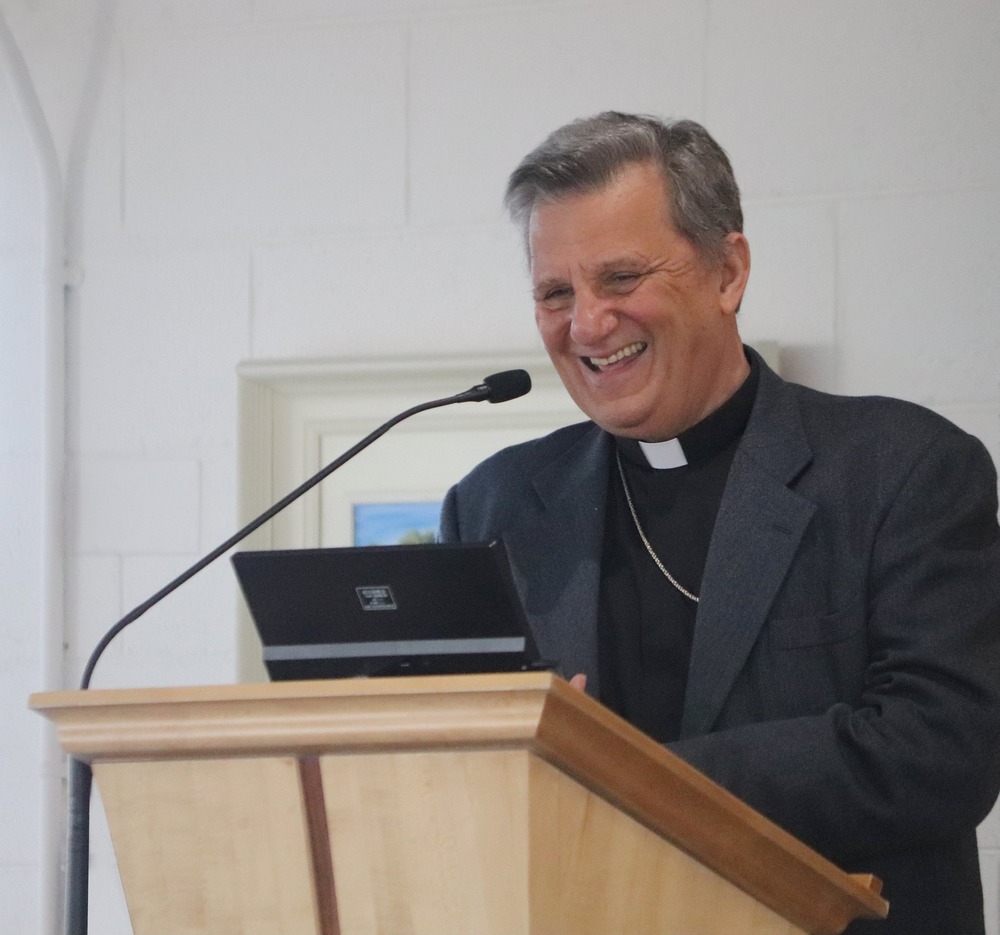
Cardinal Mario Grech, secretary-general of the General Secretariat of the Synod of Bishops, delivers a keynote address April 19, 2024, at Ireland's National Marian Shrine in Knock, County Mayo, during an April 19-20 conference on "Synodality Explored: Facing the Future Together." (OSV News/Sinead Mallee, courtesy Knock Shrine)
- Maltese Cardinal Mario Grech, 68, is the head of the Vatican's synod office responsible for implementing Francis' reform of church structures to make them more participatory and inclusive. In that capacity, he has traveled the world, effectively serving as a global ambassador of the pope's vision. If this conclave is to be a referendum on synodality, then cardinals are very likely to consider whether Grech could be the man to carry the project across its finish line.
- U.S. Cardinal Joseph Tobin, 72, is the archbishop of Newark, New Jersey, who, like Prevost, has spent much of his life outside of the United States. A polyglot, he traveled the world as head of his Redemporist religious order. A towering figure of a man, known for his affable personality, has led him to work well with conservatives, despite being an unapologetic champion of Francis' vision for a more welcoming church. But his original passport may be reason enough for some cardinals to dismiss him from the outset.
But as the proverbial wisdom here in Italy warns: "He who enters the conclave as pope, leaves it as a cardinal." After Francis — a pope of surprises — one should be prepared for the possibility that a surprise candidate could follow him.
The National Catholic Reporter's Rome Bureau is made possible in part by the generosity of Joan and Bob McGrath.

